How to Generate Research Project Ideas Like a Pro
How to come up with a research project idea.

Coming up with an impressive research project idea can leave you feeling as if you need to become the next Aristotle. After spending countless hours on jstor and Google Scholar, you soon discover that someone else has already written academic papers on all the brilliant propositions that you had.
What next? Frustration begins to kick in. You are stuck. It does not help if the deadline is fast approaching. You start to Google things like ‘who can do my research project for me’. However, your supervisor only wants to see the ideas that you have so that you can come up with feasible hypotheses before you narrow down to one.
Whether you get someone else to help you do research for your project or not, time is of the essence.
In this article we explore ways to generate splendid research project ideas.
How to Find Good Research Project Ideas
The good thing is that you do not have too much pressure on yourself in order to come up with great ideas for your research project. Good ideas can be found anywhere, at any time of the day or night.
Have you ever had a solution to a problem that you are having come to mind during a least expected time? That’s what aha moments are all about.
Thankfully, you need not wait for an aha moment in order to formulate awesome project ideas.
Let’s get started with how to develop awe-inspiring ideas:
Consider your Day-to-Day Activities
The best ideas are usually derived from personal experiences. We may identify a problem for which we would like a solution as a result of our daily experiences.
For example, you may have a friend who left college a few years before you. You look up to them, and hope to be like them some day. You, however, noticed that the last time you visited them, they had gained some weight, and you remember them mentioning something like struggling to get clothing for plus size women.
With this knowledge from people’s experiences, you can research on ‘Why fast-fashion brands’ inclusive sizing is a problem.’
Media and Literature
You might have noticed a consistent topic in the media or in the news. You may not have paid much attention to it, but you have seen it in passing. Back to our plus size fashion example. It may be time to take notice and find a common theme. Begin to list the questions that come to mind, for instance,
What makes it difficult for plus size women to find fitting clothing?
How did we get here? Was it a fashion designer oversight? If so, was it intentional?
As you can see, as you ask questions, it is easier to derive hypotheses. At this point, your hypothesis might be something like ‘how the fashion industry unwittingly forgot plus size fashion’. You can then find research to support your hypothesis.
Interact with People Who Are Not in Your Sphere of Influence
One of the best ways to come up with a research idea is to talk to people outside your circle of influence. By engaging with different people outside your circle, one gets to see things from a different world view.
For example, you might be studying computer science and spend most of your time hanging out with techies.
In your pursuit of a significant research project idea, as crazy as it sounds, you may want to attend an accountant's event, for example. As you listen (though you might not understand the lingo) you might hear them talk about a particular challenge they are facing in the industry.
From your perspective, it is possible to solve it via technology. Voila! During breaks, you could have a discussion with someone on the same. You might just be surprised.
Ask Your Friends
Unlike in the previous section where we proposed you take a brief break from your circle, here we ask you to engage in some serious discussion with them. Ask your friends to suggest research ideas you can use in your project.
You can also look out for areas of frustration, happiness, joy or pain that could be alleviated.
Social Media
With social media being vastly used around the world, there is a plethora of data available, for free!
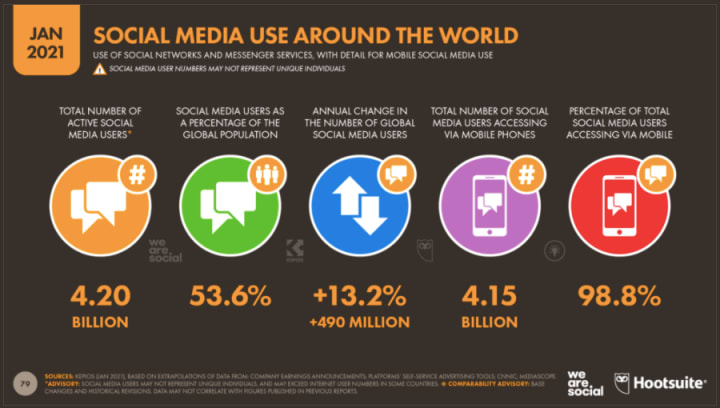
You get to access data without the time and resources needed to do a survey. Let’s say that you have started to come up with a list of propositions after taking the above discussed steps.
You now have 3 or 4 items on your list and want to choose one. You can easily do a poll on your social media profiles (brands do these all the time, by the way).
And thanks to technology, social media could go mainstream as a main tool for doing research.
Question and Answer Forums
There are several question-and-answer forums available. These include Quora, Reddit, Yahoo Answers, Stack Overflow (for developers), and Stack Exchange. These forums have thousands of users and can give you even insights on how to further refine your research project ideas.
For example, in the following Quora discussion, you can see that other people want the person who asked the question to further refine it.
Search Engines
This is kind of obvious. It is where we should have started, right? We know that you are probably a pro-Googler by the way. So why bother?
Because we wanted to give you more options. Since most people are going to Google around anyway, there is a possibility that there is a general lack of originality. And if you do know anything about the qualities of original research, you need to demonstrate independence of thought.
That said, here are some tips that can help you ‘Google around’ more effectively.
Google Search
In order to use Search effectively, you need to have a clue about what your topic is about (hence the need for the previously discussed steps). Armed with a topic like ‘plus size women and fashion’, you are better placed as the topic is not too general.
However, if push comes to shove, you can key in ‘project ideas about’ and then start typing letters, starting from a letter ‘a’. Google’s autocomplete feature will help you out here.
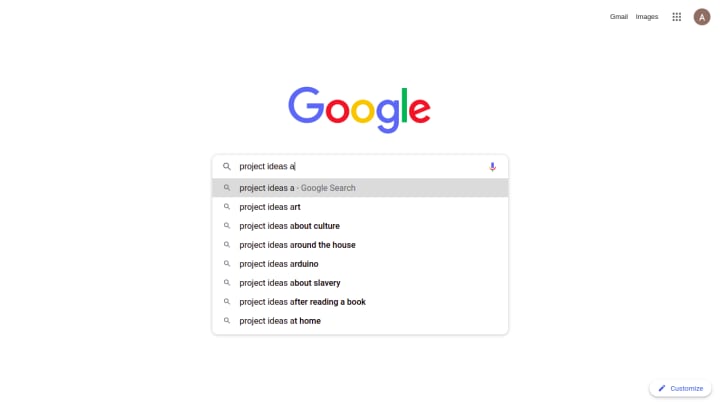
Google Trends
As a first step, go to Google Trends and type your main topic, for example ‘plus size fashion’ and customize according to the place you want to research on time, category, and web search.
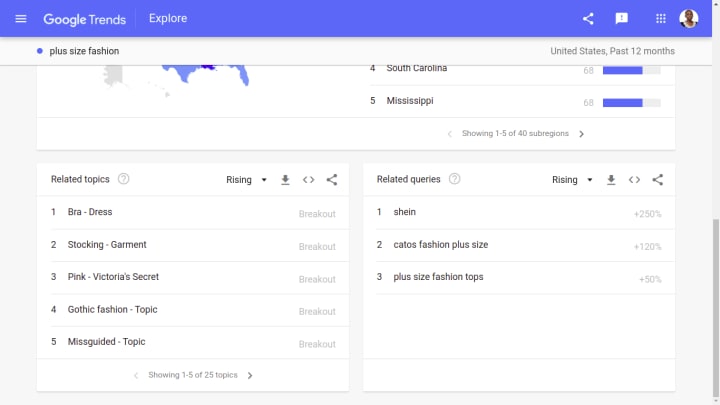
Of interest is the ‘related topics’ section. Look for a distinct angle. In the above Google Trends example, ‘missguided’ seems intriguing. While it may be a brand name, it is a homophone to ‘misguided’. Do you remember our hypothesis about plus size fashion being unintentionally forgotten?
That might be a fitting research topic after all!
Other Search Engines
Have you ever tried to look for some information on Google, but could not find anything substantial? Well, that is when you remember that there are more search engines beside Google.
Sometimes, the research topic idea that you are looking for can only be found on other search engines like Bing (the 2nd largest search engine by market share in the United States after Google). You can also try Ask.com, or Yahoo.
Steps After Identifying Your Research Project Ideas
Whichever strategy you use, you will probably come up with several ideas, but follow these tips to help you choose the best one:
Go Through General Background Information
It is important to have a general idea of how a topic relates to broader issues. You can look for an Encyclopedia Brittanica reference, for example. You will also come across the vocabulary that is used when describing the topic. You could use the words you find here for further research, later on.
For example, these are the Encyclopedia’s results in ‘plus size fashion’:
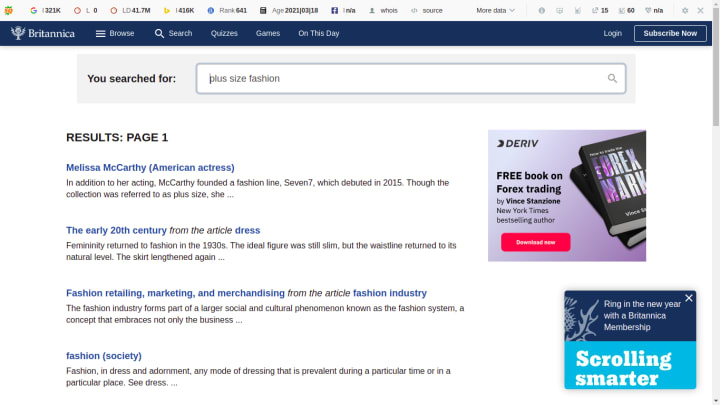
You can see terms like ‘the fashion system’. You can also explore a section on ‘feminism in fashion’ in your research.
Narrow Down your Topic
The easiest way to narrow down your topic is based on various factors like geography, time frame, population group, culture, and discipline.
Here is a how to narrow down our ‘plus size fashion’ example using the aforementioned factors:
- geography - plus size fashion in Mississippi
- time frame - plus size fashion in the 21st century
- population group - plus size fashion for middle-aged ladies
- culture - plus size fashion in Indian culture
- discipline - plus size fashion and profit margins in the fashion industry
Stay Flexible
Don't get too attached to a topic. It could be a great idea, but once you start doing your research, it could be a total flop. You are more likely to keep modifying your topic with further research. Also note that thinking about a new topic doesn't mean you have to abandon an old one; you can always return to your original ideas and see which ones work best later.
Factor in the Lecturer’s Requirements
Your lecturer has likely given you general guidelines about your research paper. Use these to determine things like your research paper’s length and depth. Other factors like the deadline can also influence whether you need to hire the services of a research project professional who can help you further refine your topic.
Formulate Your Research Question
Creating a research question is an art. We will probably need to do a comprehensive piece on that in the near future. However, the following examples should help you draw up your research question:
- What actions should social networking platforms take to protect users’ personal data?
- What is the effect of glacial melting on penguins in Antarctica?
How To Tell If Your Research Project Idea is Worth Pursuing
By now, you have settled down on a project idea and even formulated a research question. How do you know whether to put in the effort to begin writing your research paper?
Your idea, even when existent, brings to the fore a fresh perspective
Your idea solves a problem - "You know when you have a great idea when you see a problem which others don't see and you know how to market the problem and the solution," said Arun Verma, founder of TeacherOn.
Your idea is easy to understand - if your concept is simple to grasp, it is likely to be a good project idea.
Your heart is in it - make sure you have fallen in love with the idea.
In Conclusion
We have looked at how to come up with ingenious ideas for your research project. It is important to get this one right, as it dictates whether you get stuck later on in your research. Though the process may be seemingly time consuming, it is worth every step.
We have also gone through the next steps you need to take after you have listed several research project ideas. Of importance is to stay objective, as things could easily change. You may end up having to let go of your favorite idea.
Ultimately, we have listed a short checklist that you can use as a litmus test to determine whether your research topic is worth pursuing.
This article was originally published on gradeexpert.com/blog


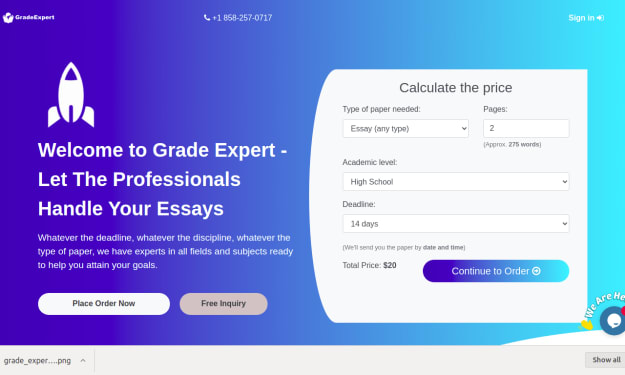



Comments (2)
Nice Article! Thanks for sharing with us :-) <a href="https://brollyacademy.com/tosca-training-in-hyderabad/">Tosca Training Hyderabad</a>
Online Quran Pakistan has been established with the aim of teaching the Holy Quran with proper Punctuation and vocabulary, our tutors are well qualified and experienced and provides classes with proper Tajweed Rules Via Skype online globally. We do not have any restrictions on age or gender. Our purpose is to spread genuine online Quran facilities to people who still can’t find a home-based permanent tutor for themselves. So with the help of our English Quran reading capabilities, people can learn and understand the knowledge of the Quran which Allah sent to us for our benefit ... Visit : https://onlinequranpakistan.com/